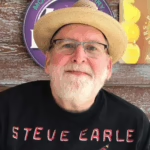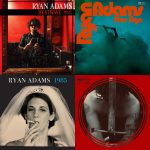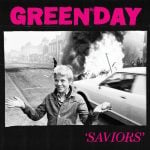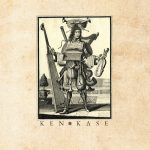Mountain Stage with Larry Grace Featuring Wilco, Peter Case, Garrison Starr & more: Templeton-Blackburn Alumni Memorial Auditorium on the campus of Ohio University; Athens, OH; Sunday, April 30, 2023
To be honest, when we purchased the tickets for the Mountain Stage performance over in Athens, OH, we were just looking forward to seeing Wilco again, and were glad to hear that Peter Case was also on the bill, but we weren’t sure what exactly to expect. Part of the problem is no doubt rooted to the fact that the long-running live concert radio show may play on 300 NPR radio stations around the nation, but not on the one we listen to that comes out of Cincinnati, with a satellite station in Oxford. Turns out the show was recorded and will be edited for NPR broadcast some Sunday night in September.
Add to that the complete absence of parking near the campus venue, which left us scrambling and ultimately arriving in our balcony seats a half an hour into the program, as Peter Case was beginning his first song. He was playing acoustic guitar and singing, “Every 24 Hours,” from his 2007 release on Yep Roc Records, Let Us Now Praise Sleepy John, for which Case was nominated for the Grammy for Best Traditional Folk Album. Case reported that that album had been re-released last year on its 15th anniversary, the song about a world where we “live in a whirl of wonder and greed.” Introducing a second song from that album, “Underneath the Stars,” Case explained that the album was full of songs he’d written about life in American, and “unfortunately, those songs are just as relevant today.”
As Case pulled out a harmonica out of his coat pocket he told a great story about his Dad’s dislike for the musical taste of his kids when they were teenagers. In his youth, Case’s father had loved big band jazz, traveling around upstate NY to see shows by the Glenn Miller Band, Cab Calloway and the like, and when his Dad liked some jazzy piece of music that was playing, he’d say “that’s hot!” In honor of his father, Case invited the crowd to join in a sing-along, saying it was just one word and two numbers, before he dove into the mouth harp blowing a very catchy jazz melody, stopping at the end of each verse and chorus, for the crowd to say “Pennsylvania 6-5000,” a Miller song that was actually an old school phone number. We shouted out the number for three verses, and then announced together, “That’s hot!”
Case then moved to the grand piano near the back of the stage, and due to a sound person who missed their cue, started telling a story about how he taught himself to play piano as a young boy. We could barely hear his voice or the piano coming through his monitor for nearly two minutes where he seemed to describe how he taught himself to play early rock & roll in the boogie woogie mode, and then said he developed some jazz chops playing something from John Coltrane. Then as he was about to start a song, his voice and piano came out of the house PA and we could hear well, as he delivered two songs from his newest album, Doctor Moan, which was self-released through a fan financed kickstarter campaign. The first was “Have You Ever Been in Trouble,” with repeated refrain, “ask and you’ll receive,” and the second, “Downtown Nowhere’s Blues,” with the chorus line, “you know we don’t get along.” I’ve seen Peter Case at least a half dozen times since he started his solo career, after he left his gig in the Plimsouls, and tend to think of him performing primarily on 6 and 12 string guitars, but he exhibited solid piano chops as well as his consistent strong songwriting skills.
When Peter finished, he waved and left the stage to applause, as Larry Grace, the Mountain Stage MC and the Mountain Stage band came on stage to do all that required radio talk about sponsors and then the band played a bit of instrumental music as the stagehands set up for the second hour of the show. Once everything in place, including Garrison Starr the next singer/songwriter to perform, Grace introduced her describing her as an artist who had success in the late 90’s, including performing on the Lilith Fair stage, but that in spite of releasing 16 albums or EPs over the course of 25 years she has struggled to overcome her oppressive childhood raised in conservative Evangelicalism as a gay woman.
Starr opened with her song “Dam That’s Breaking,” which takes on her experience of religious trauma in the opening lines: “It’s as old as sin/Honey, you ain’t born again/You just changed the way you wanted to pray.” Starr’s music is basic acoustic folk/rock, with solid melodies that show off her strong singing voice. She described spending the time working on her latest album, Girl I Used to Be, coming to terms with her identity as a mature gay woman still struggling with the negative tapes in her head hanging over from her strict religious upbringing, as an intro to her next song, “The Devil in Me,” an ode to self-acceptance. As she explained that she has reached a place where she can reclaim the love and appreciation that she had for Gospel music and group singing, the Mountain Stage band joined her on stage including two background singers to perform a song she dedicated to her grandfather, “Train That’s Bound for Glory.” She broke a string on her acoustic guitar on that number, so one of the singers offered her his acoustic guitar, which led into her final number, a hopeful number, “Better Day Coming.”
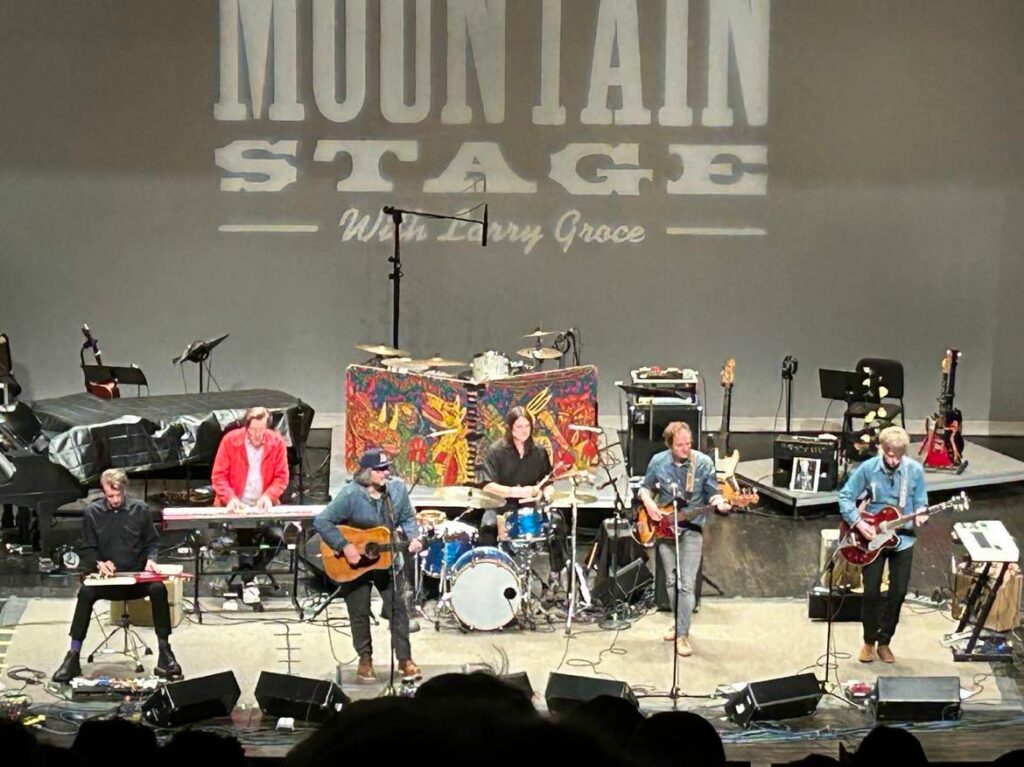
Grace arrived to send of Starr and say more of the things radio MC’s tend to say, and then introduced the Mountain Stage’s pianist, who performed a lovely solo jazz instrumental, titled “Night Mist Blues.” Then Grace returned to kill time before what he promised would be an “extended set from the evening’s headliner, Wilco,” while the band’s stage crew were busily readying the stage for their set. I have to say as someone who’s seen Wilco at least 15 times in their nearly 30 years of existence, I’ve never seen them play on such a stripped-back stage setup. There were small, practice size amps at either end of the stage for guitarists Nels Cline and Pat Sansone, Pat also had one keyboard facing away from center stage, Mikael Jorgensen had a larger electric piano set behind where Nels’ amp and a chair sat. Glenn Kotche’s drum kit wasn’t on a riser, and looked smaller, less extra percussion present, just the essentials, and a small amp for bassist John Stirratt. It was obvious they were aiming to control the sound, now doubt to create the best possible sound for the radio broadcast.
When they did come to the stage, Jeff Tweedy was wearing a ball cap and an acoustic guitar, and they played the two opening tracks from their 12th album released 11 months earlier, Cruel Country: “I Am My Mother,” and the title track. Cline played lap steel, as the band leaned into the country rock vibe that dominates that double album. After greeting the crowd, Tweedy introduced the next song, from the band’s 2011 album, The Whole Love. “The Art of Almost” was reinvented as a more acoustic, but still jazzy number, with Cline taking a light, melodic solo on electric guitar, followed by a spacey piano solo from Jorgensen, but Kotche’s drum-work maintained the flavor and energy of the original, although the sound was very different than the intense rock of the original recording. Tweedy conceded after it ended and the applause subsided, that “it sounds a bit different on the record.”
Tweedy who later said that his father had once told him he had a face for radio, leaned into his comical side, introducing “Please Be Wrong” as “one of a thousand songs I’ve written for my wife, before beginning the opening line, “please be wrong/about everything.” Tweedy teased the next song as having lyrics that were 600 years old, adapted from an anonymous poem, as an intro to “Bird Without a Tail – Base of My Skull.” The song began much like the recording, with Tweedy singing the songs rhyming lines, “When the bird began to fly/Like an eagle in the sky…” the band followed his lead playing on acoustic guitar as the sound molded around the essential melody, until he reached the instrumental section where things slowly began to expand. Sansone picked out a short run of a few high notes, and as he repeated them soon Cline was playng a harmony from the other side of the stage, the two playing an extended dueling guitar solo, both playing independently at the same time finding unique moments of harmony, when that seemed to reach a conclusion of sorts, they all kept playing and soon the intensity began to build again, this time around Kotche’s spirited, smart drum rhythms and the whole band pushed to another crescendo, before Tweedy’s acoustic again dominated the sound, and soon they were back into the song and the final couplet, “When my heart began to bleed/Was death and death, indeed.” It was a totally unexpected, intense instrumental jam, this 6 piece band at the top of their game. It was a moment of artful improvisation and combined artistic energy. It sent shudders down my spine.
The followed that with another of Tweedy’s poppier country songs, “Tired of Taking it Out on You,” with three part harmonies added by Stirrat and Sansone singing the oohs. Tweedy explained there was a long history of poets and songwriters bargaining with death, before he added “I wanted to get a piece of that action,” by introducing “A Lifetime to Find.” A fun country number, with a solid Kotche and Stirrat kicking rhythm, and Cline playing a solo with an acoustic dobro with silver circle on top on his lap to play slide while Sansone was playing on against him on a Telecaster. “The Universe” gets a longer acoustic guitar introduction by Tweedy, but it’s an elegant ballad to the skies above. To introduce “Hearts Hard to Find,” Tweedy explained that there are those times when you just can’t find the depth of feeling that a person who has died deserves. When some in the crowd sighed, he announced that “songwriting is supposed to be honest.”
As he introduced “She’s My Rock,” a song recorded by Stoney Edwards, he acknowledged, “I don’t know if you can say this on NPR, but this song is about slut-shaming.” And then to clarify, “it’s anti-slut-shaming… let’s be clear about that… it’s very anti slut shaming.” They got about 8 measures in and Tweedy stopped the song, conferred quickly with the rhythm section, before returning to the mic to say, “now, this is a great song, and we want to do it right, so we’re going to start it again, and I’m singing in my very deepest voice,” before beginning again in a register that is usually reserved for the likes of Johnny Cash. The song was actually great, and when they finished, Tweedy agreed, saying “See wasn’t that worth it.”
Then to finish off the set proper, Tweedy led the band into one of his best pop songs in some time, “Falling Apart (Right Now),” another clever song no doubt written for his wife, asking her to wait until he’s finished before she falls apart so that at least one of them is able to hold it together. Cline took an electric solo playing all the notes at the bassiest end of his electric guitar, while Sansone played at the higher end of the register. Larry Grace then brought everyone back to the stage, Case and Starr and all the rest, plus the Mountain Stage band, for a large group rendition of “California Stars” the Tweedy/Billy Bragg song written with Woody Guthrie’s lyrics. Grace had announced who should solo when and who should sing, like an orchestra conductor, and it was just lovely. A good time was had by all.
Brian Quincy Newcomb has found work as rock critic and music journalist since the early 80's, contributing over the years to Billboard Magazine, Paste, The Riverfront Times, and The St. Louis Post-Dispatch. [Brain sadly passed away on April 15, 2024, but his reviews live on as a lasting tribute to his impact on music journalism. We keep him on our minds with every review we post.]

